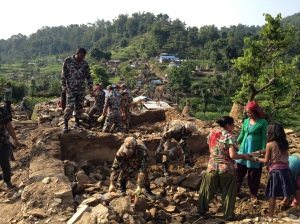An ambivalent issue.
Prostitution is a tacitly sanctioned institution which flourishes in any society where men are shamelessly desperate and the women completely helpless. Can we imagine men walking down the streets of Thamel trying to attract female clients? It would not hurt anyone for a change!
Considering the downright unethical nature of this trade, it should be prohibited. Especially in a country like Nepal where bridging the gender imbalance has come to a stand as the most important determinant in the overall growth of the country.
But if we cannot efface this heinous flesh trade and the safety of the women involved are concerned, legalizing prostitution would be a necessary evil. At least legalizing it will encourage provisions which will regulate the women’s health conditions, their pay and protection from violent men if necessary.
It is quintessential to separate moral issues from the reality of prostitution if legislation is to formulate such a law. Can prostitution be treated with complete indifference so as to consider it as a trade for women to earn a decent living? Are people ready to let go of the stigma attached with this profession? If yes, then legalizing it is the most pragmatic step that the government can take.
Such a sensitive matter will only raise more questions, hence, this issue needs to openly discussed.
Prostitution is a tacitly sanctioned institution which flourishes in any society where men are shamelessly desperate and the women completely helpless. Can we imagine men walking down the streets of Thamel trying to attract female clients? It would not hurt anyone for a change!
Considering the downright unethical nature of this trade, it should be prohibited. Especially in a country like Nepal where bridging the gender imbalance has come to a stand as the most important determinant in the overall growth of the country.
But if we cannot efface this heinous flesh trade and the safety of the women involved are concerned, legalizing prostitution would be a necessary evil. At least legalizing it will encourage provisions which will regulate the women’s health conditions, their pay and protection from violent men if necessary.
It is quintessential to separate moral issues from the reality of prostitution if legislation is to formulate such a law. Can prostitution be treated with complete indifference so as to consider it as a trade for women to earn a decent living? Are people ready to let go of the stigma attached with this profession? If yes, then legalizing it is the most pragmatic step that the government can take.
Such a sensitive matter will only raise more questions, hence, this issue needs to openly discussed.



